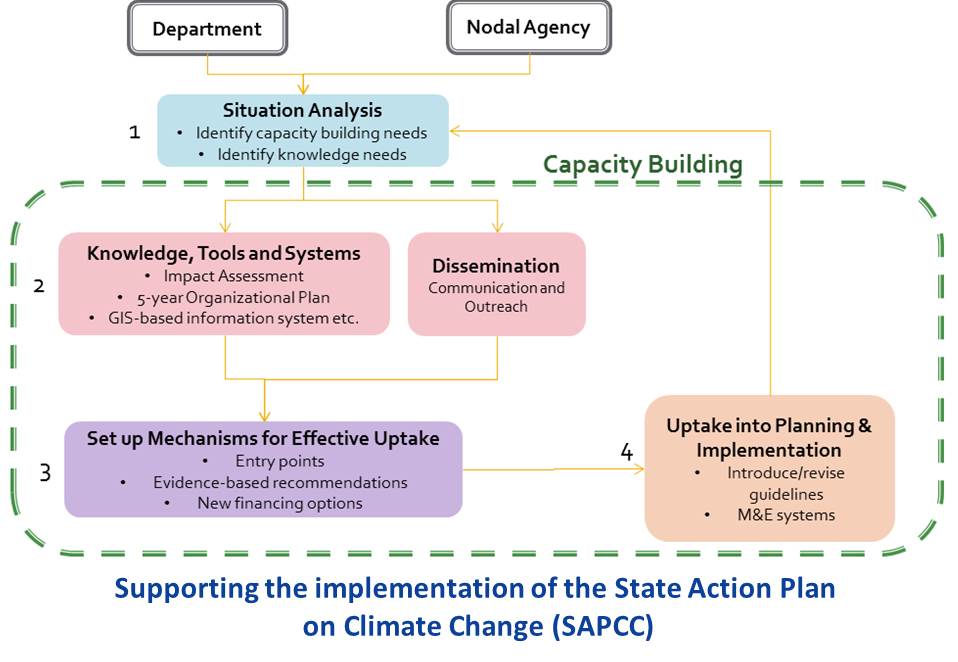Walking the Talk:
Implementing Plans into Actions
C
limate change is a serious threat confronting the world today and uncertainties associated with climate variability pose great risks to development in India. An important way to deal with climate change is to mainstream it into decision making processes and increase the political discourse on climate change. To ensure that the decision making leads to better ‘on ground’ implementation, there exists the need for easier communication and information transfer between the national, state and local levels1.At the state level, there are means and capacities for
mainstreaming climate change into decision making processes – and nowhere is
this in full swing quite like in Madhya Pradesh. With an agrarian economy
and natural resources dependent livelihoods of the majority of its
population, Madhya Pradesh (MP) tends to be vulnerable to the vagaries of
climate change. The State Knowledge Management Centre for Climate Change (SKMCCC)
has been set up by the Environmental Planning and Coordination Organisation
(EPCO) in Madhya Pradesh to cater to the information needs of various
stakeholders i.e. policy makers, scientific and academic community and
general public on climate change issues. The State Action Plan on Climate
Change (SAPCC) has been devised by EPCO to recommend appropriate adaptation
guidelines with the aim of strengthening developmental planning process of
the state and adequately address climate change concerns.

Development Alternatives is currently providing technical assistance to SKMCCC under a DFID-supported initiative to primarily strengthen and build capacities of both SKMCCC and the state departments that work in the area of climate change. To address the substantive needs posed by concerning departments, creation of strategic climate change knowledge is required in addition to identifying the modalities of accessing climate finance. The chief mandate is to facilitate the implementation of various proposed activities and functions of SKMCCC and thus mainstream climate change concerns into departmental plans and programmes.
One of the major starting points for this in Madhya Pradesh and other Indian states will be through the implementation of the SAPCC. The State Action Plan advises a roadmap and a menu of prioritised actions to be undertaken. It is now a challenge for the states to implement this roadmap and figure out the ways to mainstream these recommendations into the planning processes. As part of the technical support, implementation of the SAPCC is being done through the following major steps:
1. Situation Analysis: Identification of existing knowledge needs and capacity building needs
2. Development of Knowledge, Tools and Systems through research papers, GIS-based systems, knowledge portals for dissemination
3. Setting up of Mechanisms for Effective Uptake: Scientific papers to provide the evidence base for recommendations, entry points identified within each department and accessing climate finance
4. Uptake into Planning and Implementation through assessment and evaluation, monitoring of existing work and extensive stakeholder engagement
For example, several districts of Madhya Pradesh have been identified as highly vulnerable when exposed to the effects of climate change
2 and further studies are underway to analyse the sensitivities at the block level of these particular districts. These district level vulnerability assessments have formed a base for capacity building and training workshops for district level officers and line departments. Interactions with them have further strengthened the research reports and create evidence-based recommendations.As COP-21 approaches and nations meet in Paris next month, all eyes will be on the way nations decide to implement their plans. States then have to play their role in implementation of carbon adaptation and mitigation strategies and work as described above will be immensely important in converting those plans into action. q
Rowena Mathew
rmathew@devalt.org
Endnotes
1 Dubash, Navroz K. and Jogesh,Anu. 2014. "From Margins to Mainstream: Climate Change Planning in India as a ‘Door Opener’ to a Sustainable future," Centre for Policy Research (CPR), Climate Initiative.2 SKMCCC (EPCO). 2014. "Vulnerability Assessment of Madhya Pradesh towards Climate Change – a study under the MOEF-GIZ project on ‘Climate Change Adaptation in Rural Areas of India’".